Last Updated on May 22, 2025 by Taylor Trahan
What’s a trip to a new city without a solid sampling of all the local food? Have you even been to France if you haven’t tried six different kinds of croissants? Unfortunately, the cost of eating out so much can really start to add up! But don’t think that traveling on a budget means that you can’t ever have a nice meal out or are destined to only eat trail mix the whole trip. It’s totally possible to eat good food on a tight budget. If you’re looking for ideas about how to travel on a budget and eat cheap on vacation, check out 17 of our favorite ways to save money on food while traveling.
Use your resources.
Hotel Breakfasts. Always check your accommodations for food that might be included in your reservation. Many hotels, hostels and bed and breakfasts offer a free (or cheap) breakfast, which is definitely worth taking advantage of! Some hotels also offer afternoon or evening snacks. Hostels often organize cookouts, pub crawls or other food-related events for a small fee, which are a great way to save money on food and experience the local culture.

Get access to a kitchen, if possible. Hostels often offer access to a shared kitchen, and many airbnbs and hotels have mini-kitchens or refrigerators in the room. Having access to a kitchen is a great way to eat cheap on vacation—simply stock up on basics at a local grocery store and cook a meal or two for yourself each day. Buying basic ingredients for easy meals, like sandwiches, is much cheaper in the long run! Plus, you can make food that you can take on-the-go.
Know where to go.
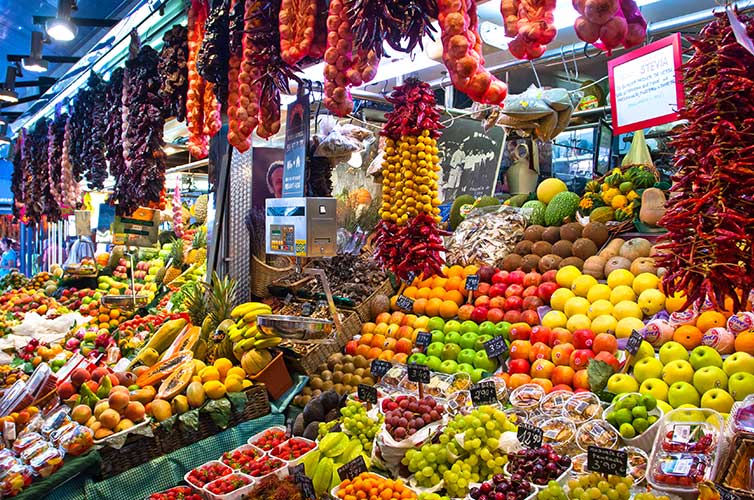
Check out the local markets. Local markets and farmers markets are great places to get delicious food on a budget and experience local culture. You can usually order food by weight, which means you only have to pay for what you’re really hungry for. Many of these kinds of local markets also offer lots of free samples—a great way to taste local specialties without having to commit to an entire dish. A local market is also a great place to grab some snacks or food for later.
Avoid touristy areas. Shops and restaurants that cater to tourists, or are located in the city center or other tourist areas, often have higher prices. Head outside of the city center for smaller restaurants. They often have more authentic food and cheaper prices. Don’t be afraid to ask for a menu before you sit down: menus that are written in multiple languages or have lots of pictures can indicate that the restaurant caters to tourists and might have higher prices.
Be creative.
Sample the local street food. Don’t be afraid of street food! It’s almost always cheap and some of the most delicious and unique food you’ll ever eat. Not to mention it’s a great way to sample local specialties. It’s a win-win-win! Nervous about dealing with a nasty bout of traveler’s tummy? Watch for long lines (usually a sign of good food anywhere), quick and freshly-made food and a clean working area. All of those things are solid signs that you’ll be good to go!
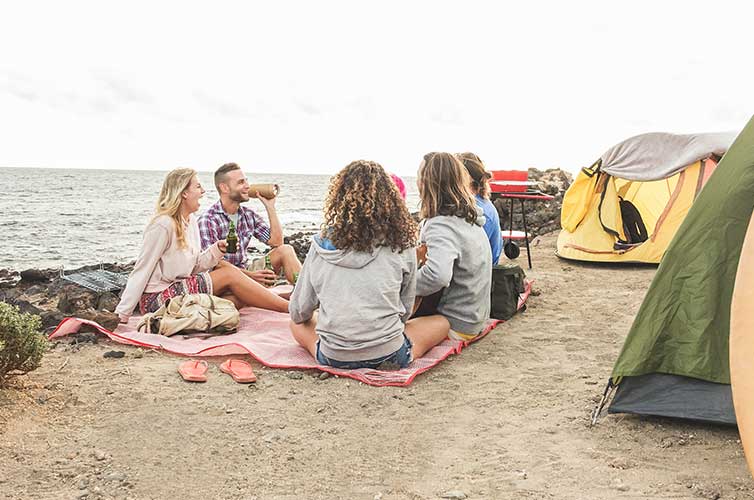
Have a picnic. A picnic is a great option if you’re traveling on a budget and want to save money on food. Pick up simple food or snacks at a local market or a small cafe and then enjoy it somewhere scenic. By the river? On top of a mountain? On a train? At the foot of a local landmark? The options are endless. Don’t pay extra for the restaurant with a view of the Eiffel Tower when you can pack a picnic and enjoy (free!) views of the tower in a nearby park.
Know when to go.
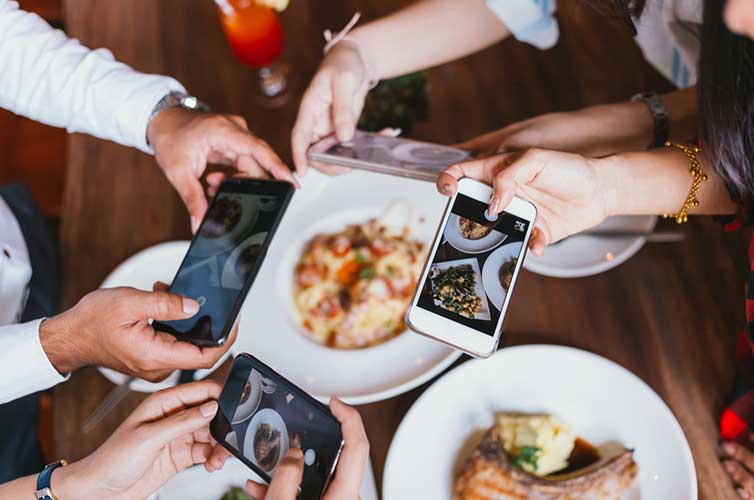
Splurge on lunch. If you want to splurge on a fancy meal, do so for lunch rather than dinner. Many restaurants and cafes have special deals for lunch menus, even if they offer the same foods. For dinner, consider opting for street food, a picnic or a local small-plate evening tradition—like tapas in Spain or aperitivos in Italy. These often have the bonus of being attached to happy hour, so you can sample the local drinks and get some dinner at the same time. Score.
Pop into bakeries and cafes shortly before closing (usually late afternoon). Sometimes they’ll put baked goods on sale to help sell as many as possible before having to discard them at the end of the day. In some places (including many cities in Europe), it’s also common to sell “day-old” pastries for a reduced price. Since these treats were usually just baked a day or two before, they’re still delicious and totally fine to eat! You likely won’t even notice the difference.
Drink smart.
Pack your own water. Staying hydrated while you’re traveling is super important, but all those disposable water bottles can really add up! Pack your own water bottle and refill it at your hotel or at a water fountain for free. If that’s not an option, buy bottled water at a local supermarket instead of a train station, airport or touristy market or stand. It’ll save a lot of money and help you stick to your vacation budget.
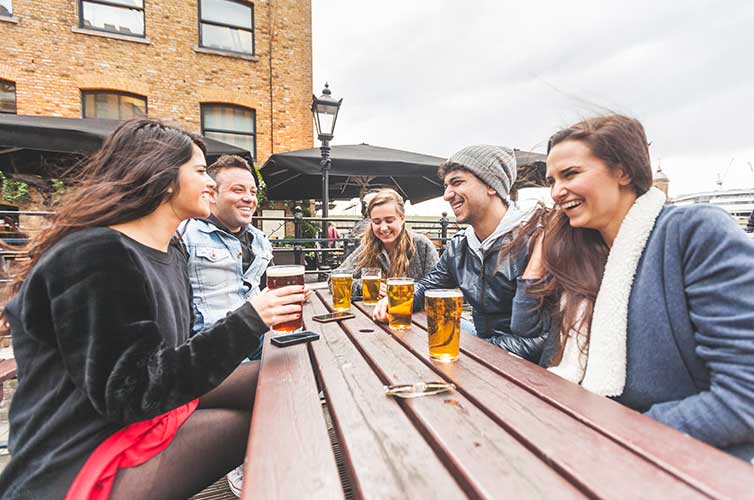
Watch the drinks. *Sigh.* We know. But check the menu carefully when you’re ordering drinks—it’s a common rule that alcohol is usually more expensive at restaurants and you may want to save fancy drinks for a local bar or pub. However, in some places (especially throughout Europe) you might find that a glass of wine or beer is cheaper than water! Ask a local where they go for a night on the town. Pubs and bars near local universities usually offer cheap student prices and are a great deal for traveling on a budget. Local breweries or wineries are good options too and they sometimes offer samples and tastings!
Don’t be afraid to…

Pack your own snacks. Pack a handful of your favorite granola bars from home, pick up some snacks at a local grocery store or grab a baguette and some cheese from a local cafe in the morning. If you have something to munch on during the day, you’ll be less tempted to grab that $12 sandwich from the first train station cafe you come across just because you’re starving.
Barter. Obviously, this won’t work in an upscale restaurant in London. However, in most areas of the world, bartering in informal settings is quite common and even expected! If you’re at a farmers market or a street food stand, don’t be afraid to politely barter for a lower price, especially if you’re buying several items (asking for a deal like, “If I buy three, can I get the fourth for half off?” often works well!). If you’re not sure if it’s okay to barter, watch the locals.

Ask a local. Ask the locals for recommendations on where to get a cheap bite to eat. Staff at your hotel or hostel, a taxi or Uber driver or a barista could all be good people to ask. They know all the best kept secrets! Someone will almost always be able to direct you to a fabulous hole-in-the-wall pizza place or an incredible cheap taco stand. Watch what the locals eat, too. Local foods are—unsurprisingly—usually the cheapest options and can save you tons of money while traveling!
Keep details in mind.
Know the fine print. When you do eat out, make sure you know what hidden costs are included in your meal. Is the water free? Are soda refills extra? Is the fresh bread they just brought out included? Does it cost extra to sit inside or outside the restaurant? Do you get a discount if you take your food to-go? These rules and costs will vary from place to place, so if you’re not sure, ask! (Or else you might end up spending $15 just on fancy water!)
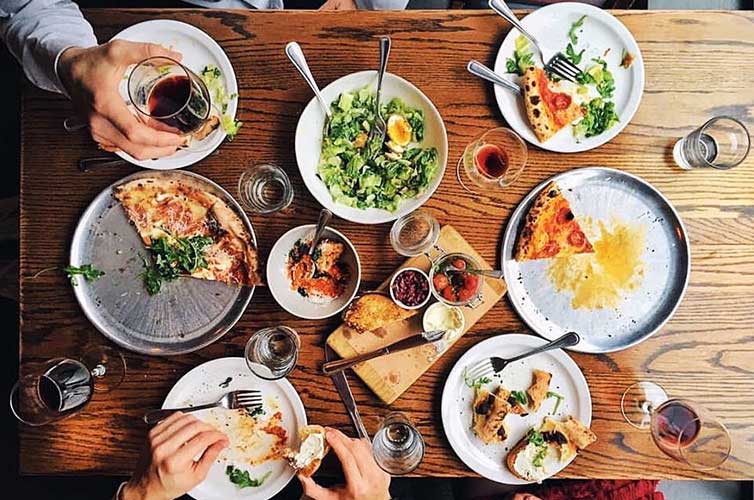
Know how to tip. In the US, it’s customary to tip 15% or more at restaurants, especially for really great service. In many other areas of the world, though, tipping is not expected. This is especially true if you order food at a cafe, a street vendor or a local market. Sometimes at restaurants a tip is automatically included with your bill. Practicing proper tipping etiquette is an easy way to save money on food. Do a little research before you go so you won’t be tipping double!
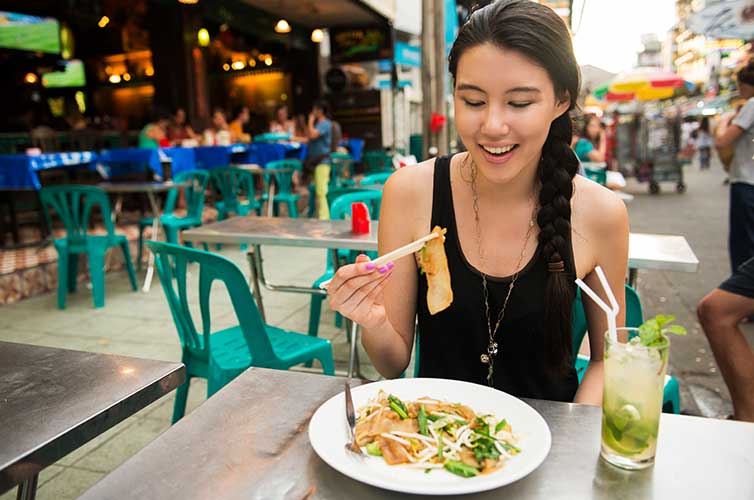
Plan ahead. Have a can’t miss meal or restaurant on your bucket list? Enjoying a fancy meal once in awhile is totally okay even if you’re traveling on a budget! Try to estimate how much you’ll probably spend at that fancy restaurant and plan ahead so you can spend a little less on other food. Planning on having a fancy dinner on Friday night? Go to the grocery store and pack a few picnic lunches to save money on food before you splurge.
Watch out for credit card fees! Most banks and credit card companies have fees for international purchases, currency exchanges and so on. Make sure you’re familiar with what your bank charges before you leave so you can avoid getting hit with a lot of extra charges. Pro tip: your best bet is usually to get cash from an ATM and use cash to pay for food and other small expenses. This way you only pay a fee once, rather than having to pay fees for every purchase you make. Another good option is to find a credit card that doesn’t charge foreign transaction fees and use that! Just be sure to have cash as a backup, as many smaller shops and cafes don’t accept credit cards.
Now that you’ve got all the tips on how to save money on food while traveling, why not save some money on your flights as well? Book a cheap flight and get student discounts, or take advantage of some our best current deals on airfare for your next vacay.


